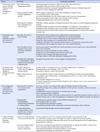Abstract
Purpose
The purpose of this qualitative study was to evaluate nursing students' experience during nursing management practicum.
Methods
Data were collected from 10 in-depth interviews. The main question was “Could you describe your experience during the nursing management practicum?” The qualitative data from the field notes and transcriptions of the interviews were analyzed using Colaizzi's method.
Results
The experiential themes of students' experience during a nursing management practicum were ‘differentiate clinical practice which is immersed in the nursing management process’, ‘understand nurse managers’ leadership qualities and influence of communication', ‘understand why the general nurse engages in management tasks on duty’, ‘gain insight into organizational operations from new and diverse perspectives’, ‘engage in nursing practice through abundant interaction’.
Conclusion
The results show that the nursing management practicum focuses on the management of nurses and nurse manager, so instruction and guidance by professors and practicing leaders is needed for students to practice these goals, In addition, in the clinical practice field, students should be provided with a practical environment and guidance in accordance with the goal of management practice.
Figures and Tables
References
1. Park JW, Ha NS. Nursing students' clinical experiences. Journal of Korean Academy of Psychiatric and Mental Health Nursing. 2003; 12(1):27–35.
2. Kang KH, Yu SY. Analysis of students experience related of nursing management clinical practice: text network analysis method. Journal of Korean Academy of Nursing Administration. 2016; 22(1):80–90. DOI: 10.11111/jkana.2016.22.1.80.

3. Jang KS, Kim NY, Ryu SA, Kim YM, Jeong KH. Effects of collaborative learning on problem-solving processes according to the level of metacognition in clinical practice of nursing management. Journal of Korean Academy of Nursing Administration. 2007; 13(2):191–198.
4. Lee MH, Kim HK, Jeong SH, Moon IO. Effects of task performance style in nursing management practicum on problem-solving and nursing competency according to communication ability of nursing students. Journal of Korean Academy of Nursing Administration. 2011; 17(1):106–114. DOI: 10.11111/jkana.2011.17.1.106.

5. Shim JK, Kwon SB, Chi SA. The development of nursing education program on web-based instruction: application to nursing management practice. Journal of Korean Academy of Nursing Administration. 2003; 9(2):283–295.
6. Jang KS, Park SJ. Effects of action learning approaches on learning outcomes in nursing management courses. Journal of Korean Academy of Nursing Administration. 2012; 18(4):442–451. DOI: 10.11111/jkana.2012.18.4.442.

7. Han MY, Jeon MK. Nursing student's nursing management clinical practices experiences. Journal of Learner-Centered Curriculum and Instruction. 2018; 18(14):93–107. DOI: 10.22251/jlcci.2018.18.14.93.

8. Kim WJ, Kim SY. A study on the effects of the nursing management practice using SBAR on nursing students' self-expressiveness, communication skills, and abilities to think critical. Journal of Learner-Centered Curriculum and Instruction. 2016; 16(9):457–472. DOI: 10.22251/jlcci.2016.16.9.457.
9. Young J, Urden LD. Student stakeholders impact redesign for management practicum. Nurse Educator. 2004; 29(6):251–255. DOI: 10.1097/00006223-200411000-00011.

10. Sharif F, Masoumi S. A qualitative study of nursing student experiences of clinical practice. BMC Nursing. 2005; 4:6. DOI: 10.1186/1472-6955-4-6.

11. Davidson PM, Elliott D, Daly J. Clinical leadership in contemporary clinical practice: implications for nursing in Australia. Journal of Nursing Management. 2006; 14(3):180–187. DOI: 10.1111/j.1365-2934.2006.00555.x.

12. Neill M, Hayward KS, Peterson T. Students' perceptions of the interprofessional team in practice through the application of servant leadership principles. Journal of Interprofessional Care. 2007; 21(4):425–432. DOI: 10.1080/13561820701443512.

13. Clynes MP, Raftery SE. Feedback: an essential element of student learning in clinical practice. Nurse Education in Practice. 2008; 8(6):405–411. DOI: 10.1016/j.nepr.2008.02.003.

14. Lee IS. Subject-specific learning objectives for nursing student education. Seoul: Korean Society of Nursing Science;2017. p. 79–94.
15. Korean Society of Nursing Administration. Performance based nursing management learning objectives [Internet]. Seoul: Korean Hospital Nurses Association;2016. cited March 20, 2019. Available from: http://www.kanad.or.kr/index.php?page=view&pg=&idx=81&hCode=BOARD&bo_idx=1&sfl=&stx=.
16. Park SA, Lee HY, Kang KA. A study on the education of nursing management practice in college of nursing. Journal of Korean Academy of Nursing Administration. 2005; 11(3):1–22.
17. Greenwood J. Critique of the graduate nurse: an international perspective. Nurse Education Today. 2000; 20(1):17–23. DOI: 10.1054/nedt.2000.0424.

18. Yi YJ. Development and evaluation of the e-learning orientation program for nursing student's adapting to clinical practicum. Journal of Korean Academy of Adult Nursing. 2007; 19(4):593–602.
19. Jho MY. An analysis of research on nursing practice education in Korea. Journal of Korean Academic Society of Nursing Education. 2010; 16(2):239–248. DOI: 10.5977/JKASNE.2010.16.2.239.

20. Colaizzi PF. Psychological research as the phenomenological views it. In : Valle RS, King M, editors. Existential-phenomenological alternatives for psychology. New York: Oxford University Press;1978. p. 48–71.
21. Lockwood-Rayermann S. Preceptor leadership style and the nursing practicum. Journal of Professional Nursing. 2003; 19(1):32–37. DOI: 10.1053/jpnu.2003.7.

22. Démeh W, Rosengren K. The visualisation of clinical leadership in the content of nursing education-A qualitative study of nursing students' experiences. Nurse Education Today. 2015; 35(7):888–893. DOI: 10.1016/j.nedt.2015.02.020.

23. Jung MS, Park KO, Kim SY, Kim EK, Kim EY, Kim JK, et al. Nursing management. 3rd ed. Seoul: Hyunmoonsa;2018.
24. Lee JH. Change nursing college students' problem solving ability, nurses' image and leadership after management clinical practice. Journal of the Korean Oil Chemists' Society. 2018; 35(1):122–130. DOI: 10.5977/jkasne.2013.19.4.594.
25. Park KO, Kim JK. A study on experience of transition from new clinical nurse to competent step. Journal of Korean Academic Society of Nursing Education. 2013; 19(4):594–605. DOI: 10.5977/jkasne.2013.19.4.594.

26. Park KO. Nurses' experience of health communication with doctors in the clinical fields. Journal of Korean Academy of Nursing Administration. 2015; 21(1):53–63. DOI: 10.11111/jkana.2015.21.1.53.

27. Park MH. Implementation of evidence based nursing education into nursing management clinical practicum: outcome evaluation and diffusion strategies. Journal of Korean Academy of Nursing Administration. 2013; 19(1):39–47. DOI: 10.11111/jkana.2013.19.1.39.





 PDF
PDF ePub
ePub Citation
Citation Print
Print





 XML Download
XML Download